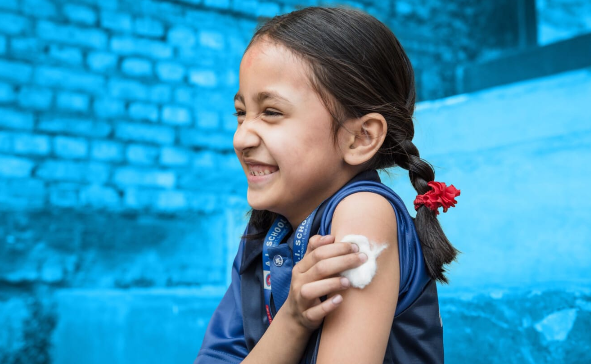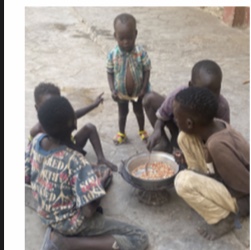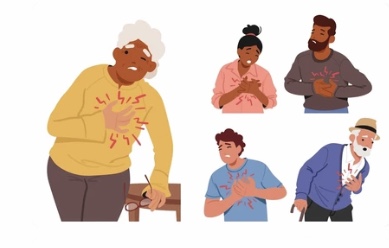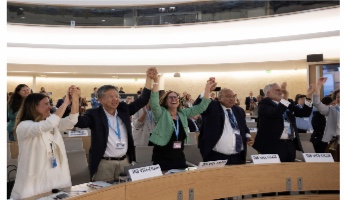Health
Global Immunization Stagnation: WHO And UNICEF Raise Alarms Over Unvaccinated Children

The World Health Organization (WHO) and the United Nations Children’s Fund (UNICEF) have raised serious concerns over the stagnation in global immunization coverage since 2022, which has failed to return to pre-pandemic levels. In a newly published report, these global bodies highlight that approximately 2.7 million children remain un- or under-vaccinated, a situation that demands urgent global attention.
According to the latest WHO and UNICEF estimates of national immunization coverage (WUENIC), the number of children receiving three doses of the diphtheria, tetanus, and pertussis (DTP) vaccine—a key indicator of immunization coverage—has remained stagnant at 84 percent, covering 108 million children in 2023. Alarmingly, the number of children who did not receive a single dose of the DTP vaccine rose from 13.9 million in 2022 to 14.5 million in 2023.
The report underscores that more than half of the unvaccinated children live in fragile and conflict-affected countries where access to essential healthcare, nutrition, and security is severely limited, leaving them highly vulnerable to preventable diseases.
Catherine Russell, Executive Director of UNICEF, emphasized the need for a coordinated global effort to bridge the immunization gap. “The latest trends demonstrate that many countries continue to miss far too many children. Closing the immunization gap requires a global effort, with governments, partners, and local leaders investing in primary healthcare and community workers to ensure every child gets vaccinated and that overall healthcare is strengthened,” she stated.
The report also highlights a worrying resurgence of measles outbreaks. In 2023, global measles vaccination rates fell short of the 95 percent coverage needed for elimination, with only 83 percent of children receiving their
first dose and 74 percent receiving their second dose. This left a significant gap in protection against outbreaks, disease, and preventable deaths.
Between 2018 and 2023, 103 countries, accounting for about 75 percent of the global infant population, experienced measles outbreaks, largely attributed to vaccination coverage falling below 80 percent. In contrast, 91 countries with high measles vaccination coverage (above 80 percent) successfully avoided outbreaks, demonstrating the crucial
role of robust vaccine coverage.
WHO’s Director-General, Tedros Ghebreyesus, emphasized the urgency of addressing these gaps. “Measles outbreaks are the canary in the coal mine, exposing and exploiting gaps in immunization and hitting the most vulnerable first. This is a solvable problem. The measles vaccine is cheap and can be delivered even in the most difficult places. WHO is committed to working with all our partners to support countries to close these gaps and protect the most at-risk children as quickly as possible,” he asserted.
Despite the overall stagnation, the report also notes some encouraging trends. The phased introduction of new and underutilized vaccines, including those for human papillomavirus (HPV), meningitis, pneumococcal disease, polio, and rotavirus, is expanding the scope of protection, especially in the 57 countries receiving support from Gavi, the
Vaccine Alliance. Notably, the percentage of adolescent girls receiving at least one dose of the HPV vaccine, which protects against cervical cancer, increased from 20 percent in 2022 to 27 percent in 2023. This progress is attributed to successful implementation in countries like Bangladesh, Indonesia, and Nigeria, and the introduction of
a single-dose HPV vaccine schedule, which has contributed to the overall increase in coverage. Sania Nishtar, CEO of Gavi, highlighted the impact of these efforts.
“The HPV vaccine is one of the most impactful vaccines in Gavi’s portfolio, and it is incredibly heartening that it is now reaching more girls than ever. With vaccines now available to over 50 percent of eligible girls in African countries, we have much work to be done, but today, we can see we have a clear pathway to eliminating this terrible disease,” she said. Despite the progress, HPV vaccine coverage remains significantly short of the 90 percent target required to eliminate cervical cancer as a public health issue. High-income countries have a coverage rate of 56 percent, while in low- and middle-income countries, it stands at just 23 percent.
A recent poll of over 400,000 users on UNICEF’s U-Report platform revealed significant gaps in awareness, with 75 percent of respondents unaware or uncertain about HPV. However, when informed about the virus and its link to cancer, 52 percent expressed interest in receiving the vaccine. Financial constraints (cited by 41 percent) and lack of availability (34 percent) are major barriers to accessing the vaccine.
Health
South Sudan on Brink of Famine as 32,000 Facing Catastrophic Hunger

The escalating conflict in Upper Nile state, South Sudan, has pushed the population in two counties, Nasir and Ulang, to the edge of famine.
According to the Integrated Food Security Phase Classification (IPC) report, 11 out of 13 counties in Upper Nile state are facing emergency levels of hunger, with 32,000 people in Catastrophic (IPC Phase 5) hunger conditions.
The conflict, which began in March, has led to intense clashes and aerial bombardments, resulting in large-scale displacement and destruction of homes and livelihoods.
Humanitarian access in conflict-affected areas remains severely constrained, leaving vulnerable communities without vital support during the lean season.
The IPC report highlights that 66% of Upper Nile state’s population, approximately 1.04 million people, are facing Crisis (IPC Phase 3), Emergency (IPC Phase 4), or Catastrophic (IPC Phase 5) levels of hunger. Malnutrition is surging among children and mothers, exacerbated by a cholera outbreak.
Humanitarian agencies are sounding the alarm, warning that the time to act is passing quickly for thousands of families in Upper Nile who are on the brink of catastrophe.
“Conflict doesn’t just destroy homes and livelihoods, it tears communities apart, cuts off access to markets, and sends food prices spiraling upward,” said Mary-Ellen McGroarty, Country Director and Representative for the United Nations World Food Programme (WFP) in South Sudan.
The international community must respond with urgency and solidarity to prevent famine and save lives.
Health
Early Signs of Stroke You Should Watch Out For

In today’s fast-paced world, especially for Africans in the diaspora balancing work, family, and the pressures of daily life, health can sometimes take a back seat.
We can get carried away by Yet, few health conditions demand as much urgency and awareness as a stroke.
Often sudden and life-threatening, a stroke can have long-term consequences but early recognition of its warning signs can make all the difference.
A stroke occurs when the blood supply to a part of the brain is cut off, either due to a blockage or a burst blood vessel.
When this happens, brain cells begin to die within minutes. According to health experts, acting fast is crucial, as immediate medical attention can greatly reduce the risk of death or a permanent disability.
One of the most important things anyone can do is to learn the early signs of a stroke.
These typically include sudden numbness or weakness in the face, arm, or leg, especially on one side of the body.
Difficulty speaking or understanding speech, blurred or lost vision in one or both eyes, dizziness, and a sudden severe headache with no clear cause are also red flags.
To help people remember these symptoms, doctors recommend remembering face drooping, arm weakness, speech difficulty and time to call for emergency services, in order to save a loved one.
For members of the African and Black diaspora, the stakes are particularly high. Research has shown that people of African descent have a higher risk of hypertension which is a major cause of stroke, as well as other underlying conditions like diabetes.
Lifestyle changes in new environments, such as increased stress, poor diet, or sedentary habits can make this risk become even greater.
Preventing stroke begins with awareness and action. Activities like regular health check-ups, managing blood pressure and cholesterol levels, staying physically active, eating a balanced diet, and reducing alcohol and tobacco use are crucial steps to take in preventing this illness.
Equally important is knowing when something is not right and seeking help immediately.
In our communities, where stories of sudden illness are very common, education about stroke needs to become part of everyday conversations.
It is not just a medical issue, it is a lifestyle concern, a family issue, and a community responsibility.
Health
World Health Organization Adopts First-Ever Pandemic Agreement

The World Health Organization’s (WHO) Member States have formally adopted the world’s first Pandemic Agreement, marking a significant milestone in the global response to pandemics.
The agreement, adopted by consensus at the 78th World Health Assembly, aims to make the world safer and more equitable in response to future pandemics.
WHO Director-General, Dr. Tedros Ghebreyesus, hailed the adoption of the Pandemic Agreement as a “victory for public health, science, and multilateral action.”
He emphasized that the agreement will enable the international community to better protect the world from future pandemic threats and ensure that citizens, societies, and economies are not left vulnerable to suffer losses like those endured during COVID-19.
The Pandemic Agreement sets out principles, approaches, and tools for better international coordination across a range of areas, including equitable access to vaccines, therapeutics, and diagnostics.
The agreement emphasizes the importance of ensuring timely and equitable access to life-saving pandemic-related health products while respecting national sovereignty.
The adoption of the Pandemic Agreement marks the beginning of a new era of global health cooperation.
An Intergovernmental Working Group will be established to develop a Pathogen Access and Benefit Sharing (PABS) system, which will be considered at next year’s World Health Assembly. After 60 ratifications, the agreement will enter into force.
Dr. Teodoro Herbosa, Secretary of the Philippines Department of Health and President of this year’s World Health Assembly, noted that now that the Agreement has been brought to life, all parties must act with the same urgency to implement its critical elements, including systems, to ensure equitable access to life-saving pandemic-related health products.
The Pandemic Agreement offers a once-in-a-lifetime opportunity to build on lessons learned from the COVID-19 pandemic and ensure that people worldwide are better protected if a future pandemic emerges.
The agreement’s emphasis on equitable access to health products, national sovereignty, and international cooperation will help to ensure that the world is better prepared to face future pandemic threats.
-

 News1 week ago
News1 week agoU.S., China Reach Preliminary Trade Deal Including Rare Earth Mineral Access
-

 News1 week ago
News1 week agoTerror Leader Calls for Attacks on Trump, U.S. Officials Over Israel Support
-

 News5 days ago
News5 days agoCalifornia Governor Gavin Newsom Accuses President Trump of “Brazen Abuse of Power
-

 News1 week ago
News1 week agoSouth Africa Flood Disaster Leaves at Least 49 Dead, Dozens Missing
-

 Diaspora15 hours ago
Diaspora15 hours agoTrump Claims U.S. Control Over Iranian Airspace, Says Country’s Supreme Leader Will Not Be Killed “For Now”
-

 News9 hours ago
News9 hours agoIran Warns Trump, Dares Him to Strike Country











